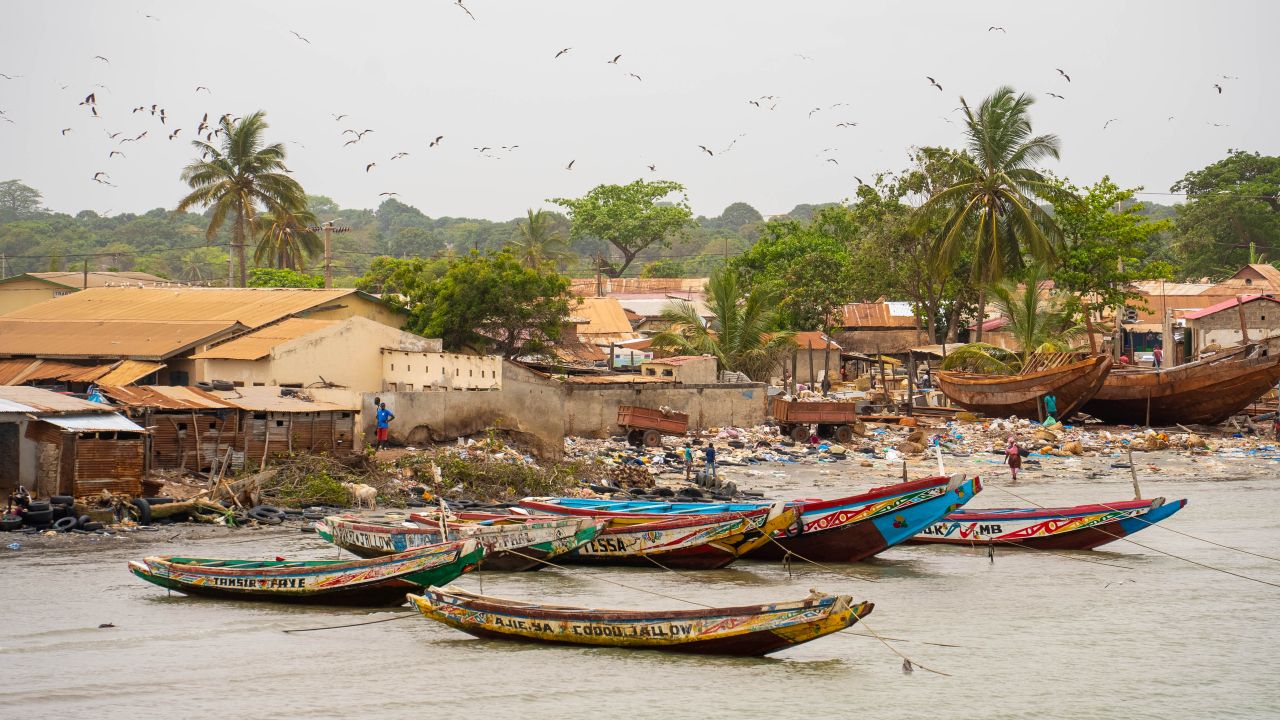The government of The Gambia has today launched its new National Action Plan to End Plastic Pollution, which was approved by cabinet earlier this year.
The launch represents a historic milestone in the nation’s journey to sustainable environmental management, and a leading example of ambitious, locally-informed national action ahead of the final round of Global Plastics Treaty negotiations this December.
- The plan sets out a roadmap to reduce plastic pollution in The Gambia by 86% over the next 10 years.
- 23,000 tonnes of plastic waste were generated in The Gambia in 2021.
- Plastic pollution in The Gambia poses harms to the environment, the tourism industry, and human health.
- With plastic waste generation projected to rise by 42% by 2033, urgent and decisive action is needed.
- Policies set out in the plan include an enhanced ban on single-use plastic bags, a phased ban on single-use plastic bottles, improved potable water supply and waste collection, and an EPR scheme for single-use packaging.
- With the Global Plastics Treaty set to be agreed in Busan this December, policymakers should look to The Gambia’s National Action Plan as a model of ambitious, locally-informed action on plastics from a coastal developing country.
Developed in partnership with Common Seas, industry experts and local stakeholders, the plan outlines a comprehensive roadmap to reduce plastic pollution in The Gambia by 86% over the next decade.
Despite its small size, The Gambia is one of the most biodiverse countries in the world per square mile, and boasts a rich variety of ecosystems including coastline, forests, savanna, wetlands, and mangrove forests.
However, these ecosystems are under threat from The Gambia’s significant plastic problem. Using its UN-endorsed Plastic Drawdown tool, Common Seas found that The Gambia generated around 23,000 tonnes of plastic waste in 2021. 75% of this waste leaked into the environment via littering, surface water runoff, and plastic escaping from landfills into the terrestrial environment, rivers and the sea.
Plastic pollution in The Gambia poses detrimental risks to the environment, the economy, and human health. Plastic waste generation is projected to rise by 42% by 2033, meaning an estimated 95 thousand tonnes of plastics will escape from The Gambia into rivers and the sea between now and 2033.
Five key policies to cut plastic pollution in The Gambia by 86% over 10 years
To tackle this problem, the government of The Gambia has committed to stopping the flow of plastic pollution by implementing five key strategies. These include:
- Enhanced bans on single-use plastic carrier bags,
- Reducing reliance on other plastic bags, including water bags, by installing public water foundations and improving the potable water supply,
- A phased ban on single-use plastic bottles and introduction of a deposit return scheme for all other plastic bottles,
- Tackling ‘one-the-go’ food and drink packaging via bans and charges, and
- Improving solid waste management through enhancing collections, storage and recycling, supported by an Extended Producer Responsibility (EPR) scheme for single-use packaging.
Implementing these policies will bring significant benefits to The Gambia. Reducing plastic pollution will minimise ocean contamination, safeguard regional biodiversity and protect the pristine natural environment that drives tourism and investment.
Small coastal developing countries like The Gambia contribute very little to global plastic production, and yet are disproportionately affected by plastic pollution. Many also rely on healthy oceans for their economies and wellbeing, making the impacts of climate change and nature loss – both driven by plastic pollution – particularly acute.
Hon. Rohey John Manjang, Minister of the Environment, Climate Change, and Natural Resources, said: “As a coastal under-developed country, The Gambia is pleased to be one of the few countries taking the lead in addressing a global planetary crisis (Pollution) through local actions on plastic wastes.
“The National Action Plan on plastic pollution is intended to strengthen the existing ban on single-use plastic carrier bags, eradicating other plastic wastes, and implement strategies to gradually phase out plastics in our general waste stream. We are open to collaboration with every person, group, organization (local and international) in the successful implementation of this action plan for the benefit of present and future generations.
“This is a clear manifestation of The Gambia’s highest political will and support, in the fight to mitigate against the negative effects of climate change and safeguard our environment.’’
Thais Vojvodic, Director of Government and Business Partnerships at Common Seas, said: “The new National Action Plan sets the stage for a more resilient and healthier future in The Gambia, showcasing the nation’s global leadership in addressing plastic pollution.”
“Common Seas is honoured to have collaborated with The Gambia’s National Environment Agency, industry experts, local businesses, and the community to co-develop a plan tailored to the country’s unique needs, including its coastal geography and tourism-driven economy. We now look forward to seeing all stakeholders unite to implement the recommended policies, significantly reducing plastic pollution and ensuring a healthy environment and a future freed from plastic.”
Financing can often be a barrier to action for coastal developing states, which typically face fewer funding options for environmental initiatives than other nations. To address this, Common Seas is hosting a financing workshop in The Gambia following the launch, to foster an inclusive, multi-stakeholder approach for the successful implementation of the National Action Plan by identifying roles, building partnerships, and exploring diverse funding strategies.
Common Seas has implemented the Plastic Drawdown tool to baseline plastic pollution and develop policy recommendations in Barbados, The Maldives, Indonesia, and Greece. The organisation has funding to support five further countries by developing similar National Action Plans through 2025.
With the Global Plastics Treaty set to be agreed in Busan this December, policymakers must seize the opportunity of INC-5 to ensure that the unique requirements and funding needs of coastal developing countries remain a core consideration in achieving a just and ambitious treaty.

